#denis constanduros
Text
"LITTLE WOMEN" (1970) Review
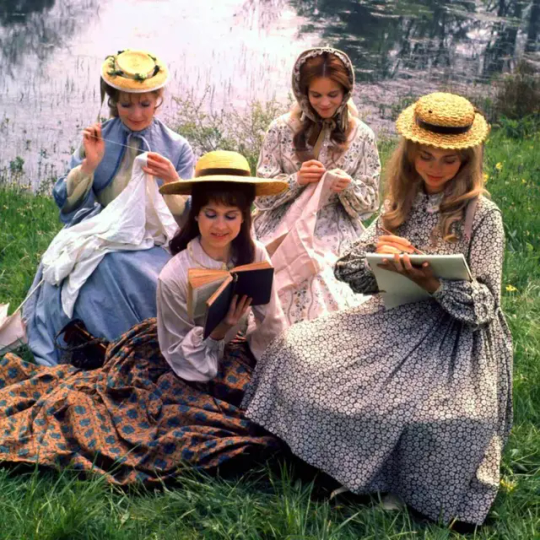
"LITTLE WOMEN" (1970) Review
It is very rare to find a British adaptation of an American novel. It is even rarer to find more than one adaptation. Louisa May Alcott's 1868 novel, "Little Women" must have been very popular with the BBC network. The latter had adapted the novel four times. Several years ago, I had seen the network's 2017 version. I thought it was the only version adapted by the BBC . . . until I had stumbled across the 1970 adaptation.
Set during the 1860s decade, "LITTLE WOMEN" told the story of the four March sisters of Concord, Massachusetts and their coming of age stories during and after the U.S. Civil War. With second daughter Josephine aka Jo serving as the story's main protagonist, the miniseries focused on the sisters' struggles with the family's diminished finances, their personal ambitions and especially their love lives. Early in the story, the March sisters become acquainted with their neighbor, one Theodore "Laurie" Lawrence, grandfather Mr. Lawrence and his tutor, John Brooke. Whereas third sister Beth develops a friendship with the elderly Mr. Lawrence, oldest sister Meg falls in love with Mr. Brooke, and the youngest Amy develops from a slightly vain and coddled child to a mature and self-assured young woman. As for Jo, the story focused on her development from a temperamental and stubborn girl, who learns to maintain her hot temper, navigate through her relationships with two men and adhere to her ambitions to become a writer.
Another surprising aspect of "LITTLE WOMEN" that I had learned was that it was the longest adaptation of Alcott's novel with a total running time of 225 minutes. This gave screenwriters Alistair Bell and Denis Constanduros to be as faithful to Alcott's novel as possible. Were they? Somewhat. The pair did take care to explore Laurie's volatile relationship with his grandfather - something that a good number of the other adaptations had failed to do. And it allowed glimpses into his growing relationship with Amy in Europe. Also, the early stages of Meg's marriage to Mr. Brooke ended up being explored, something that only the 2019 movie adaptation had repeated. I believe the miniseries did a very solid job of conveying these aspects of Alcott's novel.
But the miniseries left out Meg and Laurie's experiences at Annie Moffat's party. The miniseries also left out the sisters meeting with Laurie's English friends - something only the 2017 adaptation had included. Bell and Constanduros had changed the time period of Amy's near drowning at Walden Pond from the winter to either the spring or summer, allowing a rickety pier to send her into the pond, instead of thin ice. And it never touched on Amy's violent encounter with her schoolteacher over pickled limes. Did these aspects of the screenplay harm the production? Hmmmm . . . perhaps not. But I do feel that the miniseries' increased emphasis on the Lawrence men's relationship came dangerously close to overshadowing the March sisters' own relationships. I am relieved that the miniseries managed to focus somewhat on Jo's relationship with Professor Bhaer. However, I do have a problem with the sexist manner in which Constanduros and Bell had the professor viewed his future marriage to Jo. Whatever admiration Professor Bhaer had for Jo's writing skills seemed to fly out of the window in his anticipation of her being a good wife. Superficially, I had no problems with the brief focus on Meg and John's marriage, even if it could have been somewhat more thorough. But I believe it exposed what I believe was one of the miniseries' main problems.
"LITTLE WOMEN" did have its share of problems. Like the 1978 television adaptation, it is clear to see that it suffered somewhat from a low budget. If I must be frank, that seemed to be more obvious in this adaptation. Aside from Amy's near drowning at Walden Pond and some of European settings featuring Amy and Laurie, all other scenes had obviously been shot inside a studio. Very disappointing, considering a good number of BBC productions featured a mixture of interior and exterior shots. I found the actresses' makeup and hair - especially the latter - to be inconsistent and frankly, a big mess. Betty Aldiss' costume designs seemed solid enough, but not particularly earth shattering. Although the cast solely featured British performers, I believe a handful of them managed to handle American accents quite well - especially Stephen Turner, Stephanie Bidmead and Martin Jarvis. But despite their solid or excellent performances, the rest of the cast seemed to struggle maintaining one. And could someone please explain why three of the actresses who portrayed the March sisters seemed to be incredibly loud? Nearly every time one of them spoke, I had to turn down my television's volume. Some have explained these scenes featuring quarreling between the four sisters. They have even gone as far to claim this adaptation was the only one that featured the sisters often quarreling. Well, they would be wrong. Nearly every adaptation (I am not certain about the 1933 movie) of Alcott's novel featured quarrels between the sisters. So, this explanation does not strike me as a good excuse for the loud voices.
Judging from the previous paragraph, one would assume I have a low opinion of the majority of performances featured in "LITTLE WOMEN". Not really. Most of the performances featured in the miniseries struck me as pretty solid. Actresses Angela Down ("Jo"), Jo Rowbottom ("Meg"), Janina Faye (Amy) and Sarah Craze ("Beth") all gave solid performances and managed to capture the nuances of their individual characters in a competent manner. As I had stated earlier, I had a problem with most of them - with the exception of Craze - resorting to loud and histrionic voices in their portrayals of the March sisters at a younger age or in the case of Rowbottom, engaged in a heated quarrel. I thought Jean Anderson gave a solid performance as the stuffy Aunt March. Frederick Jaeger gave a very likeable performance as Jo's love interest, the intellectual Professor Friedrich Bhaer. And I believe the actor had a solid screen chemistry with Down. I really had a problem with actress Pat Nye, who portrayed the family's housekeeper, Hannah. Nye's handling of Hannah's American accent struck me as ridiculously exaggerated . . . to the point that her accent almost seemed Southern. Patrick Troughton, a talented actor in his own right, had more or less been wasted in his role as the family's patriarch, Mr. March. I do not believe he had spoken more than three to five lines in this production.
I can think of at least four performances that really impressed me. It seemed a pity that not one of them came from the four actresses who portrayed the sisters. Oh well. John Welsh has my vote as the second best version of Mr. James Lawrence, the March family's wealthy neighbor. I thought he did an excellent job of developing his character from a strict and curmudgeon guardian to a warm-hearted man who learned to develop a relationship with his grandson. Most portrayals of John Brooke, Meg's future husband, have never impressed me. But I must say that I found Martin Jarvis's portrayal of the character more than impressive. The actor was given an opportunity to delve more into Mr. Brooke's personality and he ended up giving one of the better performances in the miniseries. If given the chance to vote for the best performance in "LITTLE WOMEN", I would give it to Stephen Turner for his portrayal of the sisters' close friend, Theodore "Laurie" Lawrence. I suspect Turner had greatly benefited from Bell and Constanduros's script, which seemed more interested in Laurie as a character than the four leads. But judging from Turner's performance, I suspect his would have overshadowed everyone else's due to the actor's superb handling of the character. I also have to compliment Stephanie Bidmead's portrayal of the March family's matriarch, Mrs. "Marmee" March. Not only did I find her performance warm and elegant, but it also lacked the dripping sentimentality of the earlier versions and the heavy-handed attempts to make the character "modern" - relevant to today's movie and television audiences.
"LITTLE WOMEN" had its flaws. I cannot deny this. But I feel its flaws - which included a limited budget and some questionable American accents - were not enough to dismiss the nine-part miniseries as unworthy. I believe the 1970 miniseries proved to be a lot more solid and entertaining than some fans of Alcott's novel believed, thanks to Paddy Russell's competent direction, a damn good screenplay by Denis Constanduros and Alistair Bell, and a first-rate cast led by Angela Down.
#costume drama#period drama#period dramas#little women#little women 1970#louisa may alcott#little women bbc#jo march#angela down#meg march#jo rowbottom#janina faye#amy march#sarah craze#beth march#stephanie bidmead#stephen turner#martin jarvis#frederick jaeger#patrick troughton#pat nye#u.s. civil war#john welsh#paddy russell#denis constanduros#alistair bell
6 notes
·
View notes
Photo
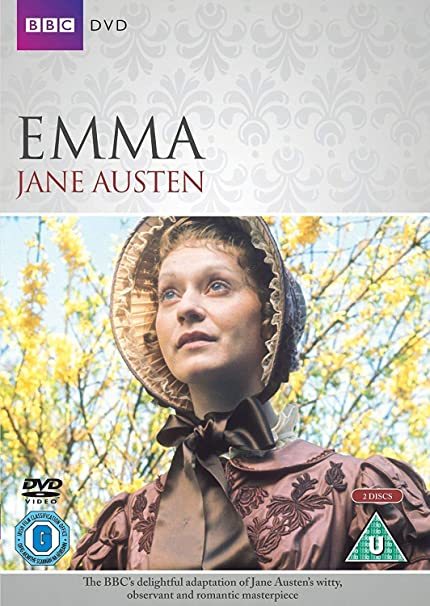
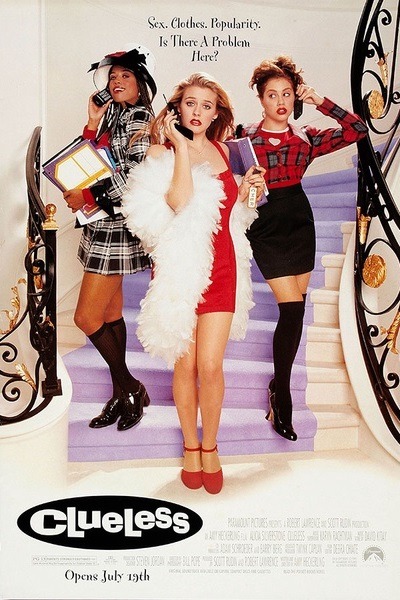
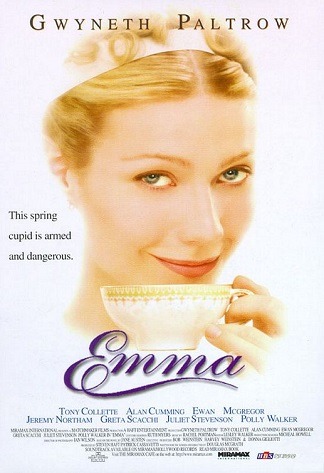
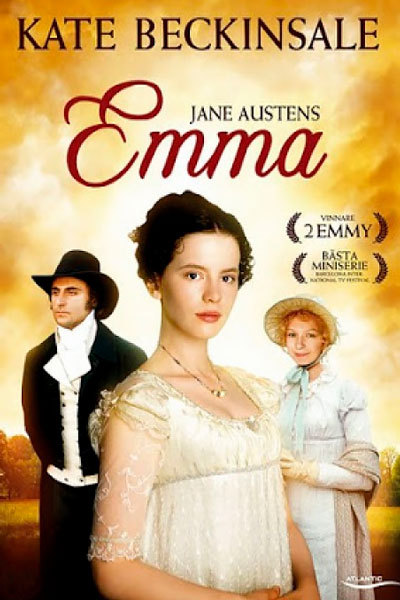
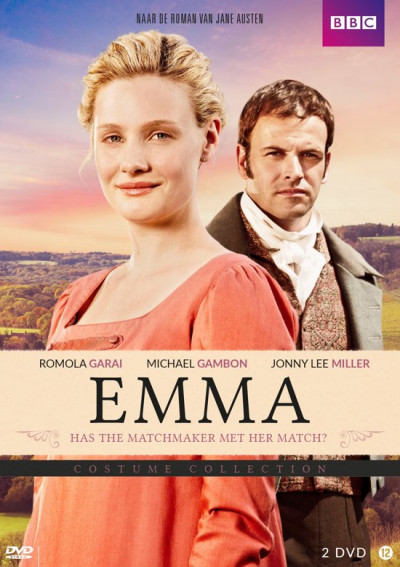

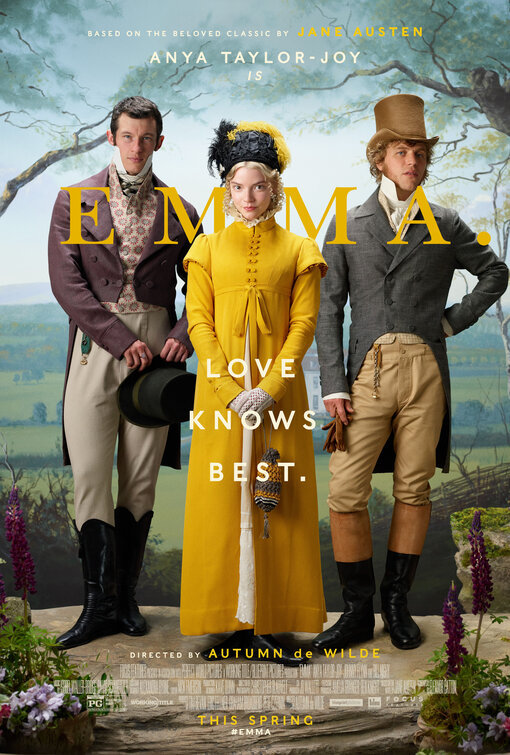
Emma
Classic and loose adaptions from 1972, 1995, 1996 (x2), 2009, 2013, 2020
The fourth of Jane Austen’s novels, first published in 1815, has had many adaptions over the years. The ones pictured above are detailed below:
Emma (1972 Miniseries)
6 episodes x 45min
Written by Denis Constanduros, directed by John Glenister
Starring Doran Godwin as Emma Woodhouse, John Carson as Mr. George Knightley, Debbie Bowen as Harriet Smith, Timothy Peters as Mr. Philip Elton, Robert East as Frank Churchill, Ania Marson as Jane Fairfax, among others
Clueless (1995 Film)
Loose adaption set in modern Beverly Hills, USA
Written and directed by Amy Heckerling
Alicia Silverstone as Cher Horowitz (Emma), Paul Rudd as Josh Lucas (Knightley), Stacey Dash as Dionne Davenport, Brittany Murphy as Tai Frasier (Harriet), Jeremy Sisto as Elton Tiscia, Justin Walker as Christian Stovitz (Frank), among others
Emma (1996 Film)
Written and directed by Douglas McGrath
Gwyneth Paltrow as Emma Woodhouse, Jeremy Northam as Mr. George Knightley, Toni Collette as Harriet Smith, Alan Cumming as Philip Elton, Ewan McGregor as Frank Churchill, Polly Walker as Jane Fairfax, among others
Emma (1996 TV Film)
Written by Andrew Davies, directed by Diarmuid Lawrence
Kate Beckinsale as Emma Woodhouse, Mark Strong as Mr. George Knightley, Samantha Morton as Harriet Smith, Dominic Rowan as Mr. Philip Elton, Raymond Coulthard as Frank Churchill, Olivia Williams as Jane Fairfax, among others
Emma (2009 Miniseries)
4 episodes x 58min
Written by Sandy Welch, directed by Jim O'Hanlon
Starring Romola Garai as Emma Woodhouse, Jonny Lee Miller as Mr. George Knightley, Louise Dylan as Harriet Smith, Michael Gambon as Mr. Henry Woodhouse, Blake Ritson as Mr. Philip Elton, Rupert Evans as Frank Churchill, Laura Pyper as Jane Fairfax, Jefferson Hall as Robert Martin, among others
Emma Approved (2013-14 Webseries)
95 episodes x 4-8min, available on Youtube
Loose adaption set in modern US, told in a vlog format
Created by Bernie Su, from Pemberley Digital
Starring Joanna Sotomura as Emma Woodhouse, Brent Bailey as Alex Knightley, Dayeanne Hutton as Harriet Smith, James Brent Isaacs as Bobby Martin, Paul Stuart as James Elton, Stephen A. Chang as Frank Churchill, Tyra Colar as Jane Fairfax, among others
While the series is a follow-up to The Lizzie Bennet Diaries, it stands on its own.
Emma (2020 Film)
Written by Eleanor Catton, directed by Autumn de Wilde
Anya Taylor-Joy as Emma Woodhouse, Johnny Flynn as Mr. George Knightley, Mia Goth as Harriet Smith, Bill Nighy as Mr, Woodhouse, Josh O'Connor as Mr. Philip Elton, Callum Turner as Frank Churchill, Amber Anderson as Jane Fairfax, among others
*****
Personal favorite: 2009
But also: 1996 (Theatrical Film), Emma Approved
P.S.: 2020′s pretty popular, from what I’ve seen. I’ve enjoyed it myself, but it’s not among my favorite.
#emma#emma approved#period drama#jane austen adaptations#emma woodhouse#mr knightley#george knightley#emma 2009#clueless#harriet smith#frank churchill#emma 1996#emma 2020#emma 1972#there's an indian movie but it's in hindi and I haven't found it with subtitles!
45 notes
·
View notes
Text
“Emma” Adaptations
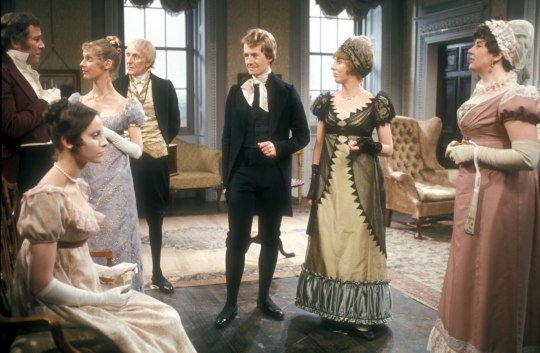
“Emma” (1972); Directed by John Glenister and written by Denis Constanduros
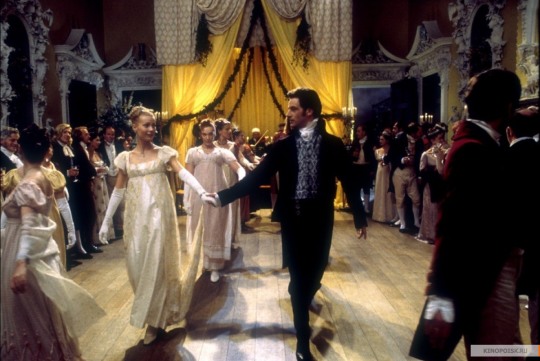
“Emma” (1996); Written and directed by Douglas McGrath
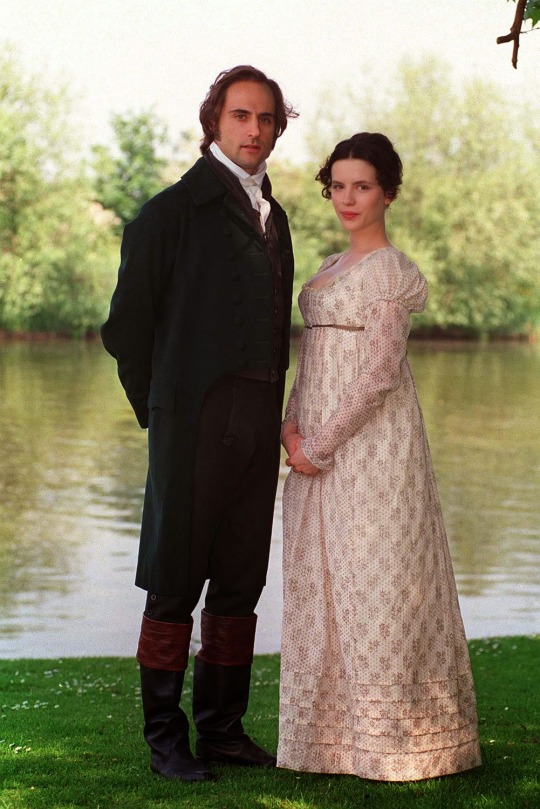
“Emma” (1996/1997); Directed by Diarmuid Lawrence and written by Andrew Davies
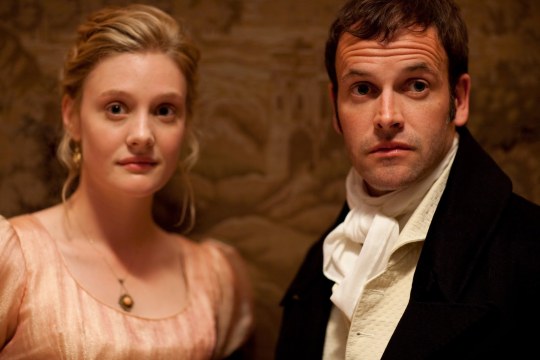
“Emma” (2009); Directed by Jim O'Hanlon and written by Sandy Welch
#emma#jane austen#emma woodhouse#george knightley#emma 1972#emma 1996 miramax#emma 1996 a&e#emma 2009#denis constanduros#douglas mcgrath#andrew davies#sandy welch#doran godwin#john carson#gwyneth paltrow#jeremy northam#kate beckinsale#mark strong#romola garai#jonny lee miller
12 notes
·
View notes
Text
Every Mrs. Weston Ranked and Rated
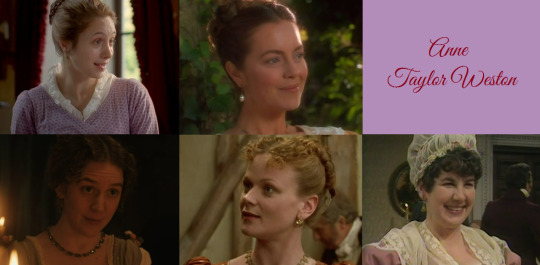
“[Emma’s] mother had died too long ago for her to have more than an indistinct remembrance of her caresses, and her place had been supplied by an excellent woman as governess, who had fallen little short of a mother in affection.
“Sixteen years had Miss Taylor been in Mr. Woodhouse’s family, less as a governess than a friend, very fond of both daughters, but particularly of Emma. Between them it was more the intimacy of sisters. Even before Miss Taylor had ceased to hold the nominal office of governess, the mildness of her temper had hardly allowed her to impose any restraint; and the shadow of authority being now long passed away, they had been living together as friend and friend very mutually attached, and Emma doing just what she liked; highly esteeming Miss Taylor’s judgement, but directed chiefly by her own.” –Emma, Chapter 1
Number 5: 1996 (Miramax)
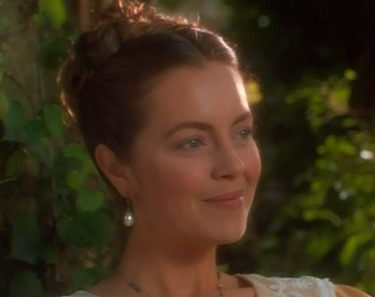
Portrayed by: Greta Scacchi
Age at time of filming: 32
Every one of the actresses who’ve played Mrs. Weston have done an excellent job, and, really she’s a hard character to mess up, so she’s usually also written very well; which makes this exercise frustratingly difficult.
Douglas McGrath’s 1996 interpretation, portrayed by Greta Scacchi, finds herself in the bottom spot, largely because (again, 1996 being a soft-take), while this version does a great job of showing what close friends Emma and Miss Taylor were, it really fails to convey her failings as a governess in any meaningful way… or any way whatsoever. In fact it sort of basks in Emma and Mrs. Weston’s friendship, with them playfully tag-teaming a game of “Let’s Tease Mr. Knightley”. Not only that, but given how childishly Emma is written in this version, you get to see how this Anne Taylor might have handled her as a child, and to be honest she’s a little too good of a guide. You can’t quite believe that “her mildness of temper” ever prevented her from “imposing restraint” in Emma. It kind of negates half of the point of her in regards to how she informed (or failed to) Emma’s character.
Rating: 3/5 Inadvisable Wedding Cakes
Number 4: 1972
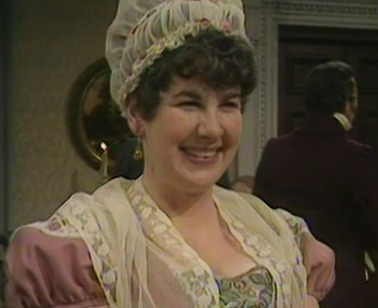
Portrayed by: Ellen Dryden
Age at time of filming: 34
There’s not a whole lot that’s good about the BBC’s 1972 mini-series of Emma, but Ellen Dryden as Mrs. Weston is one of them. While her performance falls in line with the generally on-cue style acting of the adaptation as a whole, she’s such a likeable presence that I was very willing to forgive it. She was a pleasant surprise; a Helga Hufflepuff-like figure with a cheery smile (and some really fab dresses), she even gets a few digs in at Frank, much like Mrs. Weston of the book. (really disappointed they left out the silversmith quip though.)
The only problem (aside from the on-cue acting) is, much like 1996, Denis Constanduros’s screenplay fails to adequately convey her short-comings as an authority figure, which are so important to understanding Emma’s character arc. She finds herself sitting just above Greta Scacchi, perhaps because she stood out so much and exceeded my expectations.
Rating: 3/5 Inadvisable Wedding Cakes
Number 3: 1996/97 (ITV)
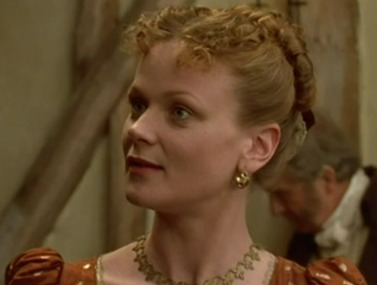
Portrayed by: Samantha Bond
Age at time of filming: 30
We’re entering into the big leagues now, with Samantha Bond, the youngest Mrs. Weston on record. Here is a Mrs. Weston who looks just perfect gabbing with Emma. While, like with 4 and 5, this adaptation runs a little soft on Mrs. Weston in text, Samantha Bond’s youth and performance both make her bond with Emma make a lot of sense, while also helping the viewer understand how having a best friend for an authority figure got Emma where she is.
That and Samantha Bond is just great, and we love her.
Rating: 4/5 Inadvisable Wedding Cakes
Number 2: 2020
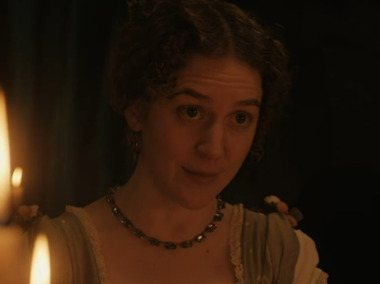
Portrayed by: Gemma Whelan
Age at time of filming: 38
What can I say? Gemma Whelan was maybe a shade older than I’d expect for Mrs. Weston but she’s just so damn delightful. The Westons are some of the few characters that, in my opinion, the 2020 version gets absolutely bang on. Not only is Gemma Whelan a treasure in the role, but the screenplay does right by the character. The opening scene doesn’t just show you the bond between Emma and Miss Taylor, it’s a touching, lovingly shot scene that makes you feel it too.
Really the only drawback to this interpretation is that there’s so little time in the two hours allotted to let her stretch her legs.
Rating: 4 ½ /5 Inadvisable Wedding Cakes
Number 1: 2009
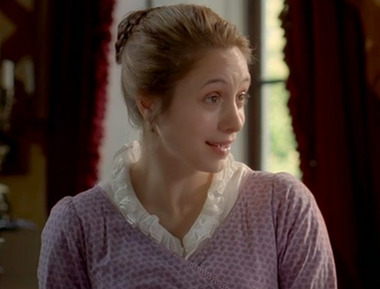
Portrayed by: Johdi May
Age at time of filming: 34
Once again surprising no one (I do hope this doesn’t become a running joke in this series, but I’m not optimistic), my number one interpretation of Mrs. Weston is 2009, portrayed by Johdi May. Once again, y’all know I love Johdi May, but no, that is not the only reason 2009 sits at the top of this list.
In fact, the biggest reason she’s my number one is to do with the writing. This is the only case in which the adaptation has the time and insight to show all of the aspects of Mrs. Weston’s character that make her an instrumental part of Emma’s story. I’ve already gushed about this in my review of this adaptation, but I just love how well-rounded this interpretation is. Not only do they not gloss over Mrs. Weston’s short-comings, they actual show you, in the first episode exactly what her dynamic with Emma was like when she was supposed to be an authority figure (and how she let Emma’s failings slide.)
Rating: 5/5 Inadvisable Wedding Cakes
~~~~
If you liked this, check out my rankings of Emma Woodhouse and Mr. Weston
#emma 2020#emma 1972#emma 1996#emma 2009#jane austen emma#johdi may#gemma whelan#samantha bond#greta scacchi#mrs weston
32 notes
·
View notes
Text
"SENSE AND SENSIBILITY" (1971) Review
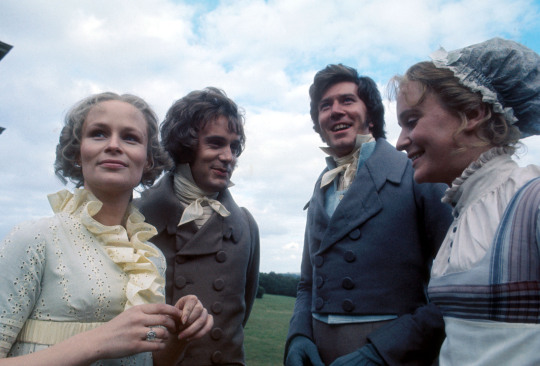
"SENSE AND SENSIBILITY" (1971) Review
For some reason, I still find it hard to believe that until recently, very few people were aware that the first adaptation of Jane Austen's 1811 novel, "Sense and Sensibility", dated as far back as 1971. After all, people have been aware of other Austen adaptations during this same period or earlier. Even the Wikipedia site fails to mention it, except in connection with one of the cast members. What was about this four-part miniseries that eluded so many Austen fans?
In "SENSE AND SENSIBILITY", a wealthy landowner named Mr. Dashwood dies, leaving his two daughters and second wife at the mercy of his son by his first marriage, thanks to the rules of inheritance. When the son fails to financially help his sisters and stepmother, the trio are forced to live at a meager cottage, thanks to the generosity of Mrs. Dashwood's cousin. The miniseries follows the love lives of the sisters, while they deal with their new penniless status.
I could have went into greater detail about Elinor and Marianne Dashwood. But what would have been the point? Austen's novel and the other adaptations have made both their story and characters well known to fans. Everyone knows that the Dashwood sisters' penniless state have made them undesirable as potential mates among the English upper-class. And many know that Elinor Dashwood is the older and more sensible sister, who kept her emotions suppressed behind a facade of stoic behavior. They also know that Marianne is the younger sisters, whose romantic enthusiasm led to emotional excesses and irrational behavior. Was there something unique about this adaptation of Austen's novel? Hmmm. Other than it was probably the first version of the 1811 novel and the first of four versions to exclude the character of the youngest Dashwood sister, Margaret.
Overall, I believe that "SENSE AND SENSIBILITY" turned out to be an entertaining and well-paced television miniseries. But it was not perfect. One, I felt that screenwriter Denis Constanduros made a few missteps in his adaptation. I wish that Constanduros had included a scene featuring John Dashwood's last conversation with his dying father. I felt that his eventually betrayal of his promise, due to his wife's capriciousness would have possessed more bite. I also felt that Constanduros could have included more scenes featuring Marianne and John Willoughy's courtship. The period between their first meeting and Willoughby's decision to end their romance seemed to go by in a flash. It happened too soon for me to understand Marianne's grief over his rejection of her. Although there were a good deal of exterior shots of the English countryside, I wish there had been more exterior shots of early 19th century London, during the sisters' trip. The London sequences made the miniseries feel more like a filmed play. And why on earth did Constanduros allowed Elinor to pay a visit to Edward Ferrars' London rooms alone? What was he thinking? He should have allowed Elinor to summon Edward to Mrs. Jennings' home in order to deliver Colonel Brandon's news about a new job. I have one last major problem. Why on earth did costume designer had Elinor and Marianne wearing identical traveling outfits? They were not twin sisters. And no siblings from an upper-class family - especially of the female gender - would be caught dead in this manner:

What was costumer designer Charles Knode thinking?
I also had some problems with the casting and performances. I had a real problem with actress Ciaran Madden's performance as Marianne Dashwood. How can I put it? It was over-the-top. I realize that she was at least 25 years old at the time this production was filmed. But did she and director David Giles really thought an exaggerated performance was necessary to portray the emotional 17 year-old Marianne? Was that their idea of portraying an emotional adolescent? And why would actor Michael Alderidge use a strong, regional accent for his portrayal of Sir John Middleton? I realize that his mother-in-law and wife came from a middle-class background. But Sir John and his cousin Mrs. Dashwood, did not. Both actresses who portrayed the Steele sisters - Frances Cuka and Maggie Jones - seemed at least a decade-and-a-half too old for their roles. And Kay Gallie's Fanny Dashwood seemed like such a major disappointment. Her Fanny struck me as too passive-aggressive and nervous in compare to the other actresses who portrayed the role.
But despite some disappointments, I must admit that "SENSE AND SENSIBILITY" turned out to be a pretty good production. Hell, I like it a lot more than I do the 1981 television version. Thanks to Constanduros's script and Giles' direction, the four-part miniseries struck me as well paced - aside from Marianne and Willoughby's courtship. Aside from the traveling outfits, I must admit that I found Knode's costume designs both colorful and elegant. And like the 1995 movie, I was happy to see that the screenplay allowed Marianne to become aware of Colonel Brandon before her meeting with Willoughby . . . allowing the pair's eventual romance in the last episode very credible.
There were also some very good performances in "SENSE AND SENSIBILITY". I found myself surprisingly impressed by Richard Owens' performance as Colonel Brandon. At first, I barely paid attention to him. But I must admit that his performance actually grew on me and I thought he did a credible job of slowly revealing Brandon's passion for Marianne. Despite his strong regional accent, I must admit that Michael Aldridge was perfectly cast as Mrs. Dashwood's gregarious cousin, Sir John Middleton. And despite her age, Frances Cuka did a very good of conveying Lucy Steele's manipulations regarding Edward, Elinor and the Ferrars family . . . even if I found it a bit obvious. I was very impressed by Milton Johns' performance as Elinor and Marianne's spineless older half-brother John Dashwood. In fact, I feel that he gave one of the better performances in the miniseries. Robin Ellis gave a solid, yet charming performance as Edward Ferrars. However, I must admit that I was not that impressed by his screen chemistry with Joanna David's Elinor. In an ARTICLE I had written about Jane Austen's rogues, I had originally stated that I found Clive Francis' portrayal of the caddish John Willoughby unmemorable. I take it back. On a second viewing, I found myself surprisingly impressed by his performance. I think I may have been distracted by the so-called Regency wig he was wearing . . . or the speed of the Marianne-Willoughby courtship. But I thought Francis, who went on to co-star with Ellis in the "POLDARK" series a few years later, gave a very complex and satisfying performance.
But there were two performances in "SENSE AND SENSIBILITY" that I found outstanding. One of them belonged to Joanna David, who was perfect - well . . . almost - as Elinor Dashwood. She was one of the few performers who managed to restrain from "playing to the second balcony" as many other stage-trained actors tend to do. Mind you, there were moments when she seemed incapable of projecting Elinor's passionate nature behind the sensible facade. But more than any other person in the cast, she did a superb job in carrying the miniseries on her shoulders. The other outstanding performance turned out to be Patricia Rutledge's portrayal of the vivacious Mrs. Jennings, Sir John's mother-in-law. She was in her early 40s at the time and technically, too young for the role. But I cannot deny that Rutledge seemed like the very personification of the verbose and interfering, yet warm-hearted widow. Of the four Mrs. Jennings I have seen, only Elizabeth Spriggs from the 1995 movie seemed her equal.
"SENSE AND SENSIBILITY" is not the best adaptation of Jane Austen's 1811 novel, despite being the first. And it possessed certain aspects in both the script and casting that I found questionable. But thanks to David Giles' direction, Denis Constanduros' screenplay, and superb performances especially from Joanna David and Patricia Rutledge; I feel that it turned out to be a pretty damn good adaptation in the end. I would highly recommend it.

#jane austen#sense and sensibility#sense and sensibility 1971#joanna david#ciarran madden#isabel dean#robin ellis#richard owen#michael aldridge#esme church#clive francis#patricia routledge#jo kendall#david belcher#frances cuka#milton johns#maggie jones#alisa grahame#elinor dashwood#marianne dashwood#period drama#period dramas#costume drama
4 notes
·
View notes
Text
Things I Like • Shell Petrol Press Ads • Black and White • Denis Constanduros • 1930s
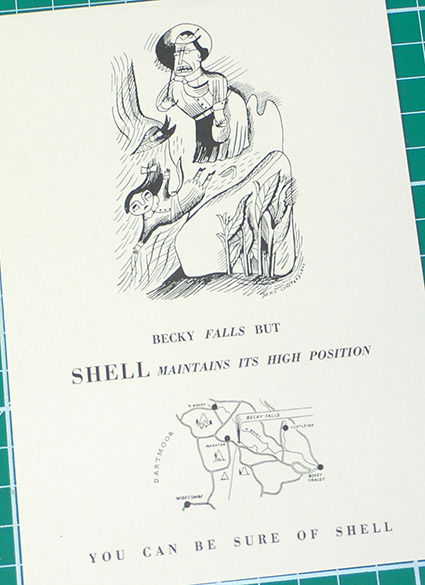
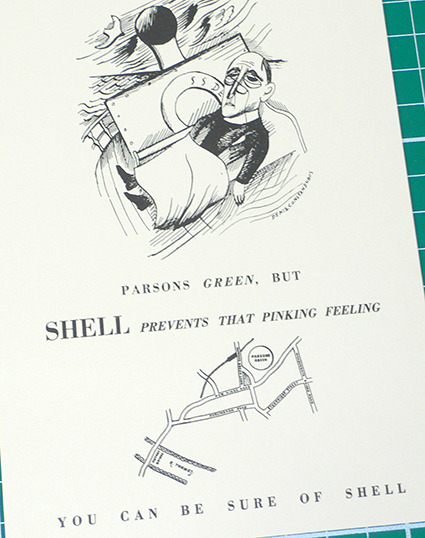
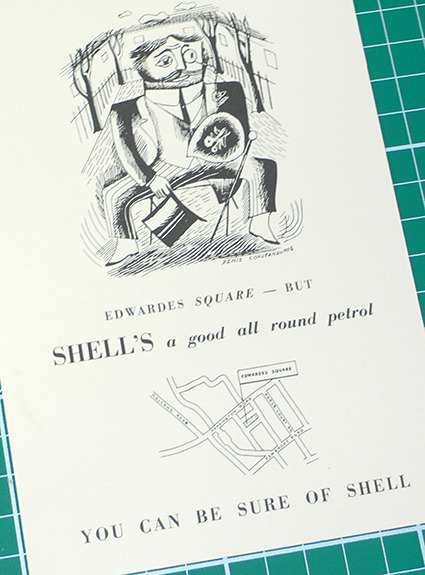
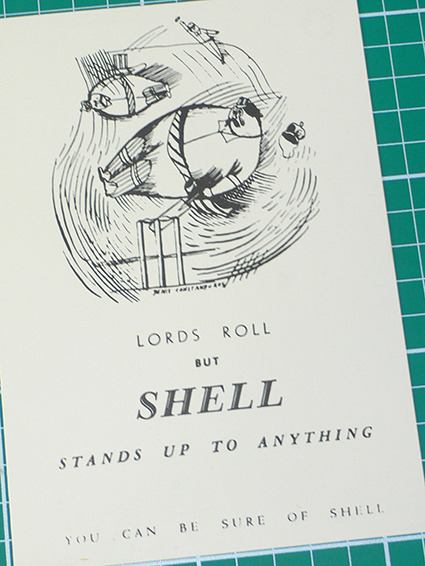
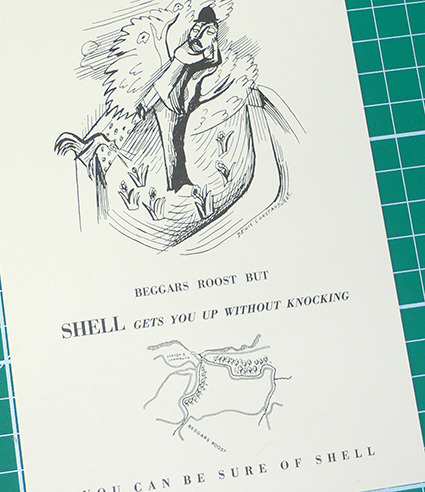
During the 1930s, Shell produced a stream of black-and-white press adverts aimed at motorists. The ads have wonderful illustrations by artists like Edward Bawden and Denis Constanduros...I recently posted about Constanduros, here
https://paulrennie.rennart.co.uk/post/187256608665/see-how-they-fly-shell-james-gardner-barnett
I forgot that I have a set of postcard with some of these ads on.
Here are the ones by Constanduros. The illustration in these ads is derived from the graphic style of Edward Lear.
I’ve posted about Lear before, here
https://paulrennie.rennart.co.uk/post/184110308700/upacking-my-library-nonsense-edward-lear
0 notes
Photo
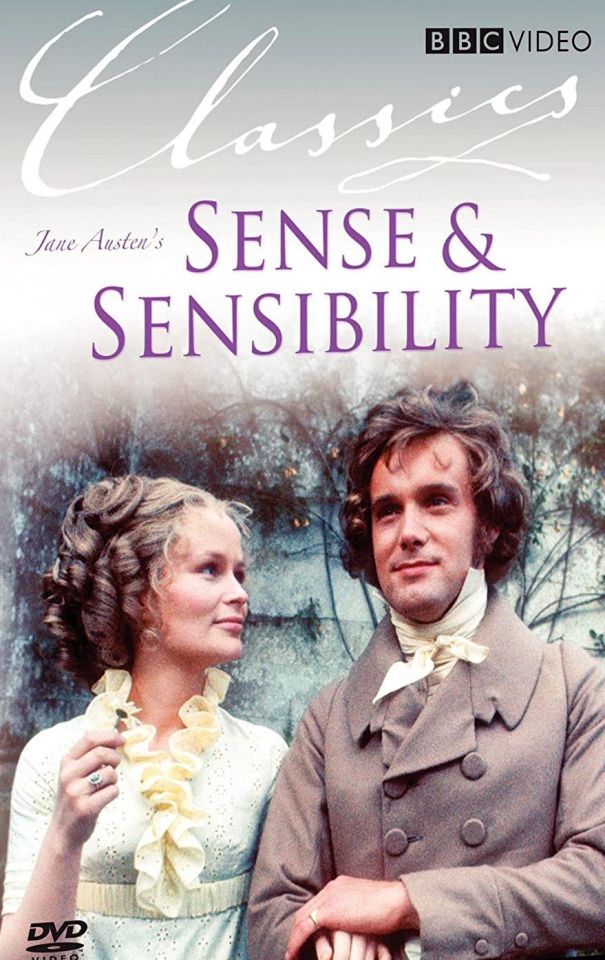
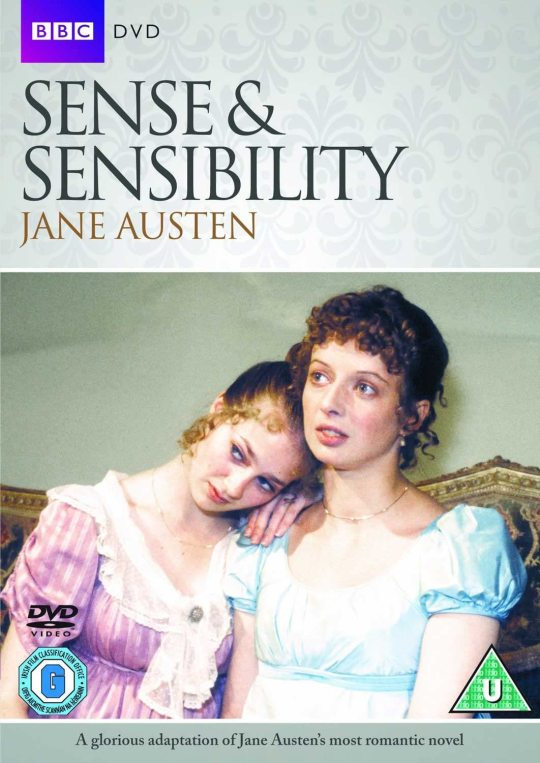

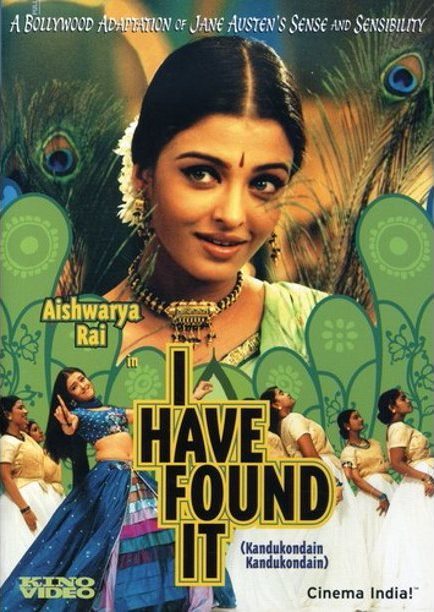
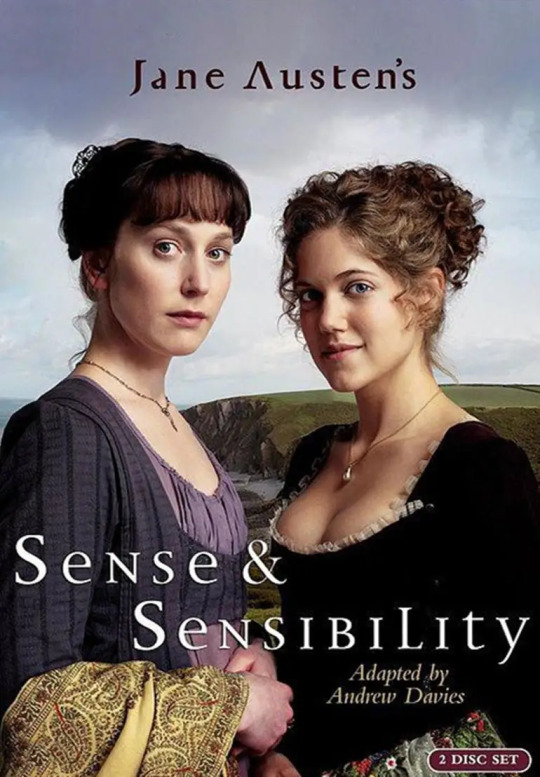

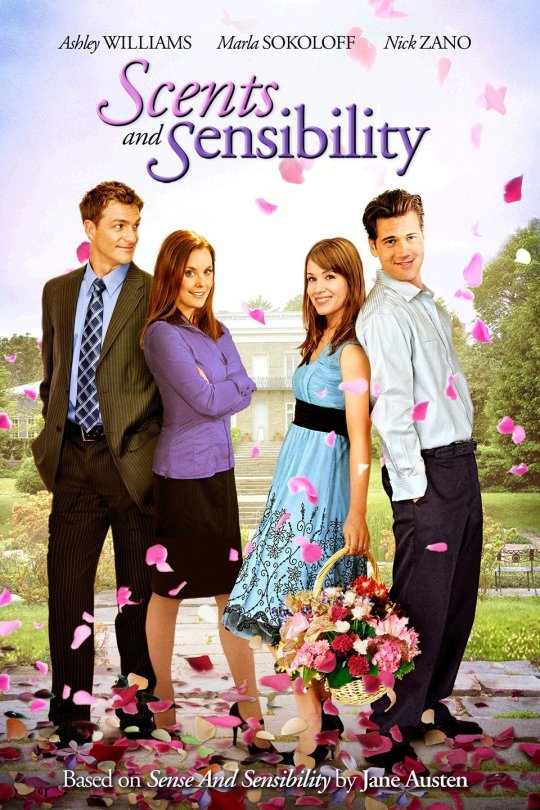
Sense and Sensibility
Classic and loose adaptions from 1971, 1981, 1995, 2000, 2008, 2011(x2)
The first of Jane Austen’s novels, first published in 1811, has had many adaptions over the years. The ones pictures above are detailed below:
Sense and Sensibility (1971 Miniseries)
4 episodes x 45 min
Written by Denis Constanduros, directed by David Giles
Starring Joanna David as Elinor Dashwood, Ciaran Madden as Marianne Dashwood, Robin Ellis as Edward Ferrars, Richard Owens as Colonel Brandon, Clive Francis as John Willoughby, among others.
Sense and Sensibility (1981 Miniseries)
7 episodes x 25 min
Written by Alexander Baron, directed by Rodney Bennett
Starring Irene Richard as Elinor Dashwood, Tracey Childs as Marianne Dashwood, Bosco Hogan as Edward Ferrars, Robert Swann as Colonel Brandon, Peter Woodward as John Willoughby, among others.
Sense and Sensibility (1995 Film)
Written by Emma Thompson, directed by Ang Lee
Starring Emma Thompson as Elinor Dashwood, Kate Winslet as Marianne Dashwood, Hugh Grant as Edward Ferrars, Alan Rickman as Colonel Brandon, Greg Wise as John Willoughby, among others.
Kandukondain Kandukondain (I Have Found It) (2000 Film)
Indian Tamil-language musical film. Loose adaption set in modern India
Written by Rajiv Menon and Sujatha, directed by Rajiv Menon
Starring Tabu as Sowmya (Elinor), Aishwarya Rai as Meenakshi (Marianne), Ajith Kumar as Manohar (Edward), Mammootty as Major Bala (Brandon), Abbas as Srikanth (Willoughby), among others.
Only Meenakshi, Manohar and Srikanth have singing parts (Sowmya appears in a few musical numbers).
Sense and Sensibility (2018 Miniseries)
3 episodes x 50 min
Written by Andrew Davies, directed by John Alexander
Starring Hattie Morahan as Elinor Dashwood, Charity Wakefield as Marianne Dashwood, Dan Stevens as Edward Ferrars, David Morrissey as Colonel Brandon, Dominic Cooper as John Willoughby, among others.
From Prada to Nada (2011 Film)
Loose adaption set in modern Los Angeles, USA
Written by Fina Torres, Luis Alfaro, Craig Fernandez; directed by Angel Gracia
Starring Camilla Belle as Nora Dominguez (Elinor), Alexa Vega as Mary Dominguez (Marianne), Nicholas D'Agosto as Edward Ferris, Wilmer Valderrama as Bruno (Brandon), Kuno Becker as Rodrigo Fuentes (Willoughby), among others.
Scents and Sensibility (2011 TV Film)
Loose adaption set in modern US
Written by Jennifer Jan, Brittany Wiscombe; directed by Brian Brough
Starring Ashley Williams as Elinor Dashwood, Marla Sokoloff as Marianne Dashwood, Brad Johnson as Edward Farrirs, Nick Zano as Brandon Hurst, Jason Celaya as John Willoughby, among others.
*****
Personal favorites: 2008, then 1995.
#sense and sensibility#period drama#elinor dashwood#marianne dashwood#sense and sensibility 95#sense and sensibility 2008#jane austen adaptations#edward ferrars#colonel brandon#I have found it#from prada to nada#kandukondain kandukondain#scents and sensibility#sense and sensibility 1981#sense and sensibility 1971
20 notes
·
View notes
Text
My Ranking of the “LITTLE WOMEN” Adaptations
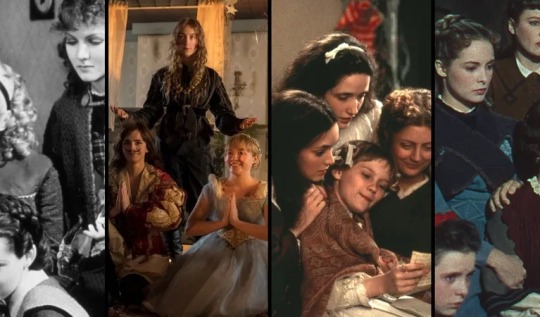
Below is my ranking of the movie and television adaptations of “LITTLE WOMEN”, Louisa May Alcott’s 1868-69 novel:
MY RANKING OF THE “LITTLE WOMEN” ADAPTATIONS

1. “Little Women” (BBC; 2017): adapted by Heidi Thomas and directed by Vanessa Caswill

2. “Little Women” (1994): directed by Gillian Armstrong and adapted by Robin Swicord
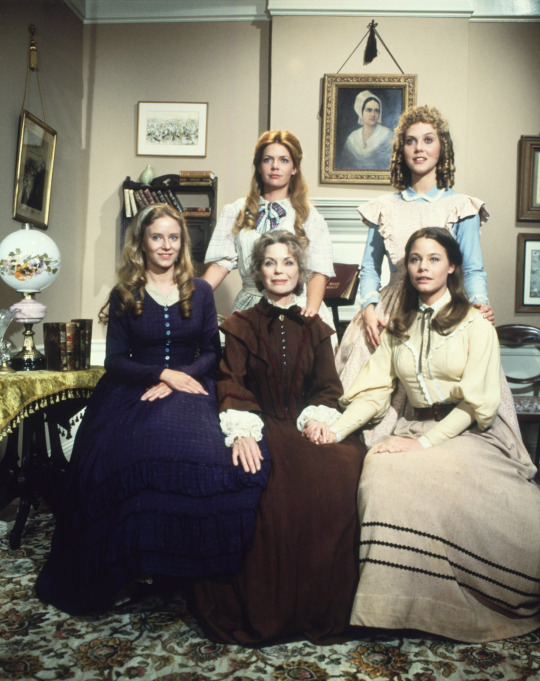
3. “Little Women” (NBC; 1978): directed by David Lowell Rich and adapted by Suzanne Clauser
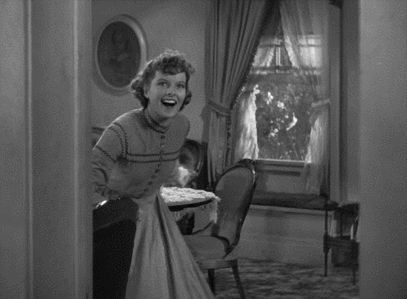
4a. “Little Women” (1933): directed by George Cukor and adapted by Victor Heerman and Sarah Y. Mason [tie]
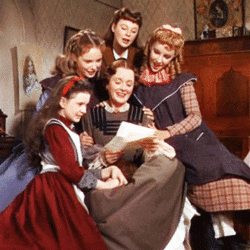
4b. “Little Women” (1949): directed by Mervyn LeRoy and adapted by Victor Heerman and Sarah Y. Mason [tie]
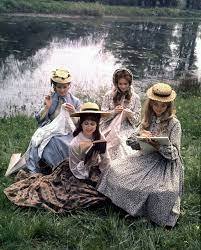
5. “Little Women” (BBC: 1970): directed by Paddy Russell and adapted by Denis Constanduros and Alistair Bell
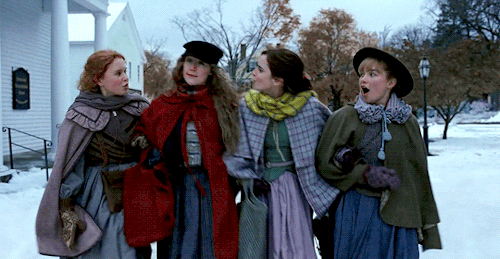
6. “Little Women” (2019): adapted and directed by Greta Gerwig
#little women#louisa may alcott#little women 1933#little women 1949#little women 1970#little women 1978#little women 1994#little women 2017#little women 2019#david lowell rich#suzanne clauser#dorothy maguire#susan dey#eve plumb#meredith baxter#ann dusenberry#greta gerwig#saoirse ronan#florence pugh#Emma Watson#eliza scalen#denis constandurous#alistair bell#jo rowbottom#janina faye#angela down#sarah craze#paddy russell#george cukor#victor heerman
51 notes
·
View notes
Text
“SENSE AND SENSIBILITY” Adapations
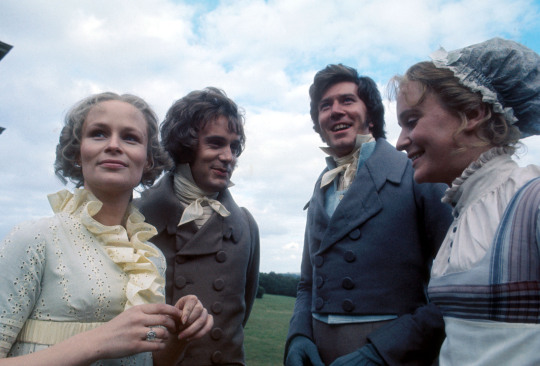
“Sense and Sensibility” (1971); Directed by David Giles and written by Denis Constanduros

“Sense and Sensibility” (1981); Directed by Rodney Bennett and written by Denis Constanduros and Alexander Baron
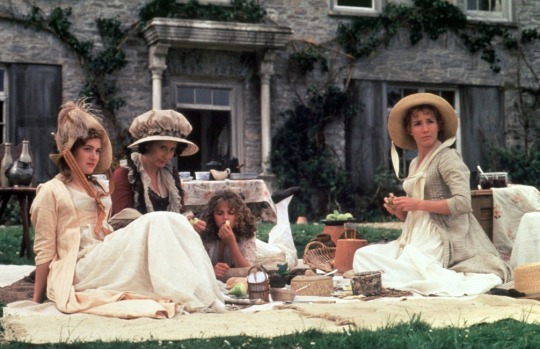
“Sense and Sensibility” (1995); Directed by Ang Lee and written by Emma Thompson

“Sense and Sensibility” (2008); Directed by John Alexander and written by Andrew Davies
#sense and sensibility#jane austen#sense and sensibility 1971#sense and sensibility 1981#sense and sensibility 1995#sense and sensibility 2008#Elinor Dashwood#marianne dashwood#edward ferrars#john willoughby#mrs. dashwood#margaret dashwood#joanna david#ciaran madden#robin ellis#clive francis#irene richard#tracey childs#emma thompson#kate winslet#gemma jones#emilie francois#janet mcteer#hattie morahan#charity wakefield#denis constanduros#ang lee#andrew davies#rodney bennett#alexander baron
13 notes
·
View notes
Text
See How They Fly • Shell • James Gardner • Barnett Freedman • Denis Constanduros • c1939
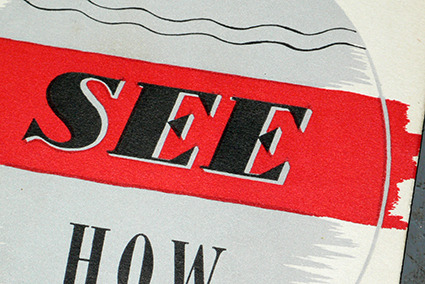
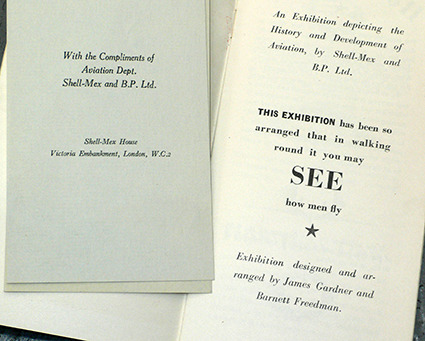
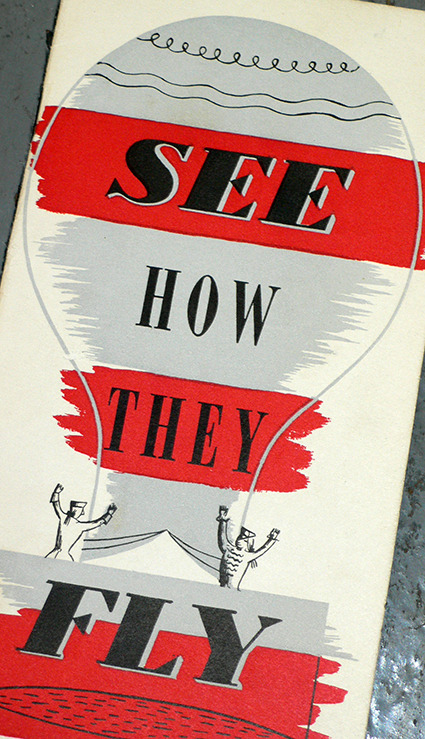
Here is a little brochure that we found recently...it’s for an exhibition, held at Shell Mex House, London, about flight, and how the whole thing works...The exhibition helped to position Shell as a company at the forefront of technical progress.
We have a few Shell items in our collection...
The advertising manager at Shell, Jack Beddington, was one of the most important design patrons in Britain during the 1930s. Beddington invited artists to produce posters; famously Paul Nash, Graham Sutherland, Edward McKnight Kauffer and many others. He also published a series of County Guides, edited by the poet John Betjeman with artists such as Paul Nash and John Piper. Beddington also commissioned a long series of black-and-white press advertisements combining illustration and clever place-name puns.
Later, Beddington was a pioneer of moving-image.
All things considered, Beddington ranks as one of the most important figures in British design.
The exhibition was organised by James Gardner and Barnett Freedman. James Gardner played an important part in both the Britain Can Make it (1947) and the Festival of Britain (1951 exhibitions). In his memoir, The Artful Designer (1993), Gardner describes the circumstances of his being invited to organise the exhibition by Shell (1993.80-87).
Barnett Freedman is another artist who we like very much. Barnett was part of what Paul Nash described as an outbreak of talent....I’ve recently contributed to a series of short interviews about this. You can see me, here
https://www.anoutbreakoftalent.com/the-contributors/
and watch two short clips of the interview, here
https://www.anoutbreakoftalent.com/portfolio-item/paul-rennie/
It was a pleasure to help Thomas Volker with his project.
Finally, the cover illustration on the brochure is signed with the initials DMC. I think this is Denis Constanduros. During the 1930s he designed a number of posters for Shell and also some black-and-white advertising drawings.
I’ve posted before about Shell and design...
https://paulrennie.rennart.co.uk/post/179514766930/unpacking-my-library-shell-brian-robb-1938
https://paulrennie.rennart.co.uk/post/106617950405/spiral-bindings-kenneth-george-chapman
https://paulrennie.rennart.co.uk/post/107008512070/spiral-bindings-shell-guide-to-dorset-paul
https://paulrennie.rennart.co.uk/post/107222540675/spiral-bindings-the-self-changing-or
I’ve also posted about Paul Nash and Barnett Freedman.
In the past, I’ve written about illustrated guidebooks. You can download the text, here
https://www.are.na/block/3162647
and about Britain Can Make It
https://www.are.na/block/4255090
and the Festival of Britain
https://www.are.na/block/3162649
You can see how I would like the typographic design of this little brochure.
The kind of paper scrap that I’ve been describing is usually described as ephemera, and classified as jobbing printing...neither of these terms do justice to the intrinsic interest and quality of these things, as evidenced above, nor to their significance as historical objects. I’ve spent the whole of my life looking at these kinds of things; I couldn’t have enjoyed myself more
0 notes
Text
"SENSE AND SENSIBILITY" (1981) Review
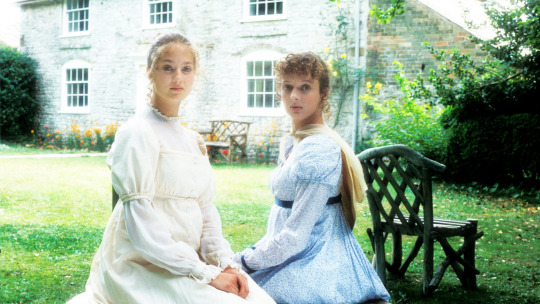
"SENSE AND SENSIBILITY" (1981) Review
Jane Austen's 1811 novel, "Sense and Sensibility" has been a favorite with her modern-day fans. The novel has produced at least three television and two movie adaptations and a literary parody. However, this review is about the seven-part, 1981 BBC adaptation.
Directed by Rodney Bennett and adapted by Alexander Baron and Denis Constanduros, "SENSE AND SENSIBILITY" starred Irene Richards and Tracey Childs as the two main protagonists - sisters Elinor and Marianne Dashwood. The story focused on the sisters' attempts to find happiness in the tightly structured society of early 19th century England. Through their experiences with men and their relationship with each other, Elinor and Marianne learn that one must strive for a balance of both sense and sensibility.
From an overall point of view, this "SENSE AND SENSIBILITY" seemed to be a solid adaptation of Austen's 1811 novel. I have noticed in many articles and reviews of Austen adaptations made in the 1970s and 1980s, fans tend to view them as "faithful" in compare to later ones. Frankly, I have yet to see an Austen adaptation made before or after 1986 as completely faithful. And I can extend this opinion to this 1981 production. One, Baron and Constanduros' screenplay began with the grieving Dashwood women returning to Norland Hall, after viewing a potential new home. And there is no sign of a Margaret Dashwood - the youngest of the three sisters - in sight. But since the other versions of the novel are no more or less faithful, I do not have a problem with this. But I did have a problem with the miniseries' ending. It featured Edward Ferrars asking for Elinor's hand in marriage and Colonel Brandon commencing his courtship of a receptive Marianne. That is it. The ending seemed a bit too abrupt for my tastes.
And I had other problems with "SENSE AND SENSIBILITY". Peter Woodward gave a charming performance as the novel's ne'er-do-well, John Willoughby. Unfortunately, Woodward's presence barely made a dent in the production. And his biggest scene - in which Willoughby expressed remorse for his bad treatment of Marianne to Elinor - featured some over-the-top acting. Watching Diana Fairfax's performance as Mrs. Dashwood, I found myself wondering why Elinor was forced to assume so much responsibility for their household at Barton Cottage. Fairfax's Mrs. Dashwood barely seemed like the emotional widow who was forced to come down to earth by her more sensible older daughter. She seemed just as sensible in her own way. I barely remember Marjorie Bland's portrayal of Mrs. Jennings' older daughter, Lady Middleton. She failed to leave a mark in my memories. I could say the same about Hetty Baynes as Mrs. Jennings' younger daughter, Mrs. Charlotte Palmer. And Margot Van der Burgh's Mrs. Ferrars seemed more like a dress rehearsal for Lady Catherine de Bourgh in Austen's "Pride and Prejudice".
But there were performances that impressed me. Julia Chambers and Pippa Sparks made a very entertaining Lucy and Ann Steele. I was especially impressed by Chambers' performance, which struck a fine balance between Lucy's scheming and desperation to become a member of the respectable and wealthy Ferrars family. Philip Bowen's portrayal of Robert Ferrars struck me as rather funny. He gave the character a foppish edge that I have never seen in other portrayals of the character. Donald Douglas was certainly down-to-earth in an affable manner as Mrs. Dashwood's cousin, Sir John Middleton. Amanda Boxer gave a spot-on portrayal of the cold-blooded and domineering Fanny Dashwood. But the one performance that really impressed me was Peter Gale's as the Dashwood family's new patriarch, John. Although he gave a solid performance in the miniseries' early episodes, he really came into his own in the role, when the story shifted to London. I was especially impressed by one scene in which Gale's John tried to point out the suitability of Colonel Brandon as a match for Elinor.
At first, I was not that impressed by Robert Swann's portrayal of Colonel Brandon. However, as the story progressed, Swann skillfully revealed the character's passion and emotions behind the stoic facade. There are two other performances of which I have a similar view. When I first saw "SENSE AND SENSIBILITY", I had regarded Bosco Hogan's portrayal of Edward Ferrars as boring. But numerous viewings made me realize that he gave a very subtle performance. With a bit of patience, I noticed how Hogan managed to express Edward's feelings about Elinor and Lucy with the expressions on his face and in his eyes. I also became more appreciative of Annie Leon's portrayal of the cheerful Mrs. Jennings. She was no Elizabeth Spriggs or Patricia Rutledge, but I must admit that I was very impressed by the manner in which she captured Mrs. Jennings' friendly, yet vulgar personality . . . especially in the production's second half. Both Irene Richards and Tracey Childs gave solid performances as Elinor and Marianne Dashwood. The two actresses did a first-rate job of holding the miniseries together as the the leads. And both were somewhat spot-on in their portrayal of the two sisters. Mind you, I would have liked if Richards had revealed the passion that Elinor harbored for Edward in small moments. And I wish that Childs' Marianne was not so sober - especially in a few scenes in the miniseries' earlier episodes. But in the end, they did a very good job.
As far as production design goes, I am afraid that Paul Joel did a solid job. But there was nothing about his work that I found particularly impressive. I suspect that he may have been hampered by the budget. I was NOT impressed by Dorothea Wallace's costumes. Frankly, I found them rather cheap looking and in some cases, slightly ill fitting. Like the miniseries' production design, it was probably hampered by the budget. Overall, I would have to say that this "SENSE AND SENSIBILITY" was the least impressive looking adaptation I have ever seen.
"SENSE AND SENSIBILITY" had its virtues. Both Irene Richards and Tracey Childs gave solid performances and kept this production together, along with director Rodney Bennett. The supporting cast also included memorable performances from the likes of Peter Gale, Amanda Boxer, Donald Douglas, Julia Chambers, Bosco Hogan and Robert Swann. And screenwriters Alexander Baron and Denis Constanduros managed to create a solid script that was nearly faithful to the story. And despite a few disappointing performances and a slightly cheap looking production, my regard for this miniseries has risen over the years. Much to my great surprise.
#sense and sensibility 1981#sense and sensibility#jane austen#irene richard#tracy childs#peter gale#amanda boxer#donald douglas#bosco hogan#robert swann#alexander baron#diana fairfax#annie leon#peter woodward#period drama#costume drama#bbc period drama
3 notes
·
View notes